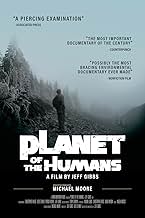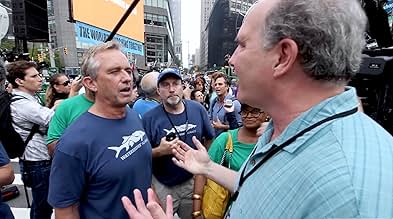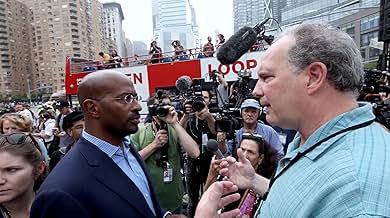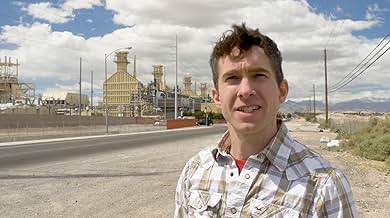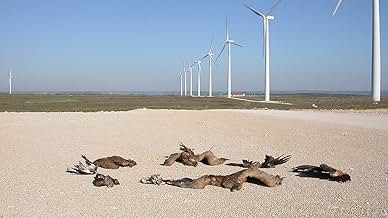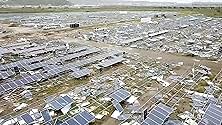Planet of the Humans
- 2019
- 1h 40m
ÉVALUATION IMDb
6,9/10
3,4 k
MA NOTE
Un regard sur la façon dont le mouvement environnemental a perdu la bataille par des choix bien intentionnés mais désastreux.Un regard sur la façon dont le mouvement environnemental a perdu la bataille par des choix bien intentionnés mais désastreux.Un regard sur la façon dont le mouvement environnemental a perdu la bataille par des choix bien intentionnés mais désastreux.
Avis en vedette
If the raison d'être of documentaries is to stimulate debate, then I think Jeff Gibbs's Planet of the Humans is a platinum award-winning standard. Brandishing his so-called life-long green credentials early in the piece, he then cynically essentially gives the international green movement both barrels, whilst stridently asserting that renewable energy is just as bad as fossil fuels, high-profile environmentalist proponents and leaders are corrupted by corporate/financial interests and population growth is the great unspoken enemy.
At a foundation level I found one of the greatest weaknesses of Gibbs's argument is that he appears to be using pretty much out of date footage to prop up a lot of his claims and criticisms. It should be noted that by my reckoning only twice during the film are talking head pieces ever given a date stamp and they related to a couple of welcome vintage film warnings about climate change and pollution, 1958 and 1963 respectively.
So then what we find is Gibbs using 2011 footage of a wind farm protest to begin a critique of wind turbines and renewable sources of power in general. To cite another pretty obvious example; a 2010 Michigan launch of the electrically powered Chevy Volt. He criticises it (and vicariously electric cars in general) because it's recharged from a power grid in Michigan dominated by coal and meanwhile overtly seeks to gather some "gotcha moments" from unwary Chevy reps. Solar power and solar arrays in general get the Gibbs treatment too. He tours a very large solar installation in Lansing, Michigan to have an energy rep rather comically report to camera that the panels have an efficiency of a "little less than 8%" and that the array could power only about 10 city homes a year." What the film doesn't say is that the footage is from 2008.
I'm not a science/tech expert, but I would respectfully suggest that throwing the spotlight on such relatively old, out of date, renewable technology examples is an absolute eternity in terms of renewables research and development over the past decade. So on a personal level, while Gibbs is claiming in the film, solar panels are frightfully expensive, have a life of only 10 years and are only rated at 8% efficient. I contrast this with the relatively inexpensive array of 18 panels on my own roof, that have a guaranteed life of 30 years, operate without a booster and are saving me on average about 60 - 65% of my previous power bills. Go figure!
Similarly Gibbs doesn't hold back from picking up the stones to throw at environmental leaders such as Al Gore and Bill McKibben, using edited grabs to push the line that these environmental ikons have sold out to capital interests for pecuniary gain. Again though, the use of footage over a decade old is predominant and to my way of thinking, creates doubt of the validity and authenticity of the questions Gibbs raises.
Ultimately Planet of the Humans is far better at pointing fingers and listing problems, than it is at offering much in the way of solutions. Executive producer Michael Moore confirmed this when being almost brutally honest in suggesting the film sought to "ignite a discussion" on the planet's future more than anything else.
At a foundation level I found one of the greatest weaknesses of Gibbs's argument is that he appears to be using pretty much out of date footage to prop up a lot of his claims and criticisms. It should be noted that by my reckoning only twice during the film are talking head pieces ever given a date stamp and they related to a couple of welcome vintage film warnings about climate change and pollution, 1958 and 1963 respectively.
So then what we find is Gibbs using 2011 footage of a wind farm protest to begin a critique of wind turbines and renewable sources of power in general. To cite another pretty obvious example; a 2010 Michigan launch of the electrically powered Chevy Volt. He criticises it (and vicariously electric cars in general) because it's recharged from a power grid in Michigan dominated by coal and meanwhile overtly seeks to gather some "gotcha moments" from unwary Chevy reps. Solar power and solar arrays in general get the Gibbs treatment too. He tours a very large solar installation in Lansing, Michigan to have an energy rep rather comically report to camera that the panels have an efficiency of a "little less than 8%" and that the array could power only about 10 city homes a year." What the film doesn't say is that the footage is from 2008.
I'm not a science/tech expert, but I would respectfully suggest that throwing the spotlight on such relatively old, out of date, renewable technology examples is an absolute eternity in terms of renewables research and development over the past decade. So on a personal level, while Gibbs is claiming in the film, solar panels are frightfully expensive, have a life of only 10 years and are only rated at 8% efficient. I contrast this with the relatively inexpensive array of 18 panels on my own roof, that have a guaranteed life of 30 years, operate without a booster and are saving me on average about 60 - 65% of my previous power bills. Go figure!
Similarly Gibbs doesn't hold back from picking up the stones to throw at environmental leaders such as Al Gore and Bill McKibben, using edited grabs to push the line that these environmental ikons have sold out to capital interests for pecuniary gain. Again though, the use of footage over a decade old is predominant and to my way of thinking, creates doubt of the validity and authenticity of the questions Gibbs raises.
Ultimately Planet of the Humans is far better at pointing fingers and listing problems, than it is at offering much in the way of solutions. Executive producer Michael Moore confirmed this when being almost brutally honest in suggesting the film sought to "ignite a discussion" on the planet's future more than anything else.
It's always good to have people question the present sacrements and enviromental solutions for our overconsumption of the natural resources.
But it isn't that well done. I would presume that his budget wasn't so big as the billionaires to state his ideas in this documentary.
The criticism that he gives no solutions is not fair, because these are not easily found when overpopulation and the lifestyle of a majority of the inhabitants of the first world countries with a gigantic carbon footprint are the source of the problem.
Who is willing to really alter their way of life?
And that's a really inconvenient truth.
Having watched this documentary, i'll be honest it has shaken me to my core. I'm someone who is very conscious to the issues our planet is going through and the increasingly serious issue of population growth. I sometimes feel helpless in trying to figure out how I can contribute further in helping this planet survive. However, I take a bit of comfort in knowing that this film will punch some common sense and put people into action. And to open our eyes to what the real issues are. Everyone must watch this documentary to properly understand what is clearly not working so that we could determine what will work to get us out of the mess we are in. And please let your children watch because after all it is there future too.
I can see greenies being very upset with this documentary - but by no means is it a fossil fuels lobby piece. It's an eye-opening look at Big Green and their hidden secret that renewables like solar, wind turbines, biomass fuel and mega battery storage is actually worse for the earth that Big Coal and Big Oil. Don't be blinded in thinking that today's big renewables are actually going to save us, because they clearly aren't. The bad thing is that this documentary does not offer any solutions beyond depopulating the earth.
8AJ4F
Critics of this film tend to be "green growth" junkies who think they're better than fossil fuel junkies. They're also eco-traitors for wanting to obliterate scenery and wildlife with millions of wind turbines. 3/4ths of the film could have dwelled on that topic. It also should have compared nuclear (SMR and other designs) to the footprint of wind. Too many Greens claim carbon is the only footprint that matters now.
But most points were strongly made. It was good to see candor on growth ideology from a well-known documentarian. Similar films from minor producers will never get the same coverage. Overpopulation was mentioned early on and repeated several times. Vain human nature was also discussed, and I think that's what offends techno-optimists the most.
In the limited time allotted for a film, it managed to cover most of the problems with "clean energy" and the "100% renewable" lie, though it didn't really mention carbon credit trickery. I only wish it had shown the vast scale of wind farms instead of a few cameos from Lowell Mountain construction, and quick shots of built projects.
There's been predictable resistance and it was temporarily pulled by the FFA site, with their own spin on why it's unfair to greentech people. Those who say it lacks "solutions" are assuming there MUST be solutions to overshoot of carrying-capacity. Says who? Look at the actual trends. They reject anything that's not endlessly hopeful, so I can see why Moore made it free online. Critics have a few points about dated material with some interviewees changing their stances, but the fundamental problems remain.
The big revelation for me was the volume of trees counted as "renewable" biomass energy, dwarfing the relatively feeble output of wind and solar. Taking away biomass makes clean energy look paltry. I still like solar when it's done right (keep it off open space).
Gibbs and Moore should do a followup in 5 or 10 years, especially if shale fracking has peaked and there's a major "We told you so!" crisis..
But most points were strongly made. It was good to see candor on growth ideology from a well-known documentarian. Similar films from minor producers will never get the same coverage. Overpopulation was mentioned early on and repeated several times. Vain human nature was also discussed, and I think that's what offends techno-optimists the most.
In the limited time allotted for a film, it managed to cover most of the problems with "clean energy" and the "100% renewable" lie, though it didn't really mention carbon credit trickery. I only wish it had shown the vast scale of wind farms instead of a few cameos from Lowell Mountain construction, and quick shots of built projects.
There's been predictable resistance and it was temporarily pulled by the FFA site, with their own spin on why it's unfair to greentech people. Those who say it lacks "solutions" are assuming there MUST be solutions to overshoot of carrying-capacity. Says who? Look at the actual trends. They reject anything that's not endlessly hopeful, so I can see why Moore made it free online. Critics have a few points about dated material with some interviewees changing their stances, but the fundamental problems remain.
The big revelation for me was the volume of trees counted as "renewable" biomass energy, dwarfing the relatively feeble output of wind and solar. Taking away biomass makes clean energy look paltry. I still like solar when it's done right (keep it off open space).
Gibbs and Moore should do a followup in 5 or 10 years, especially if shale fracking has peaked and there's a major "We told you so!" crisis..
Le saviez-vous
- AnecdotesIt was released for free for 30 days on YouTube on the 21st of April 2020 (Earth Day 2020).
- Citations
Narrator: The takeover of the environmental movement by capitalism is now complete. Environmentalists are no longer resisting those with the profit motive, they're collaborating with them.
- ConnexionsFeatured in Outsiders: Episode #5.14 (2020)
- Bandes originalesChilled Cream
Blank & Jones
Interpreted by Blank & Jones
Written by Piet Blank, jaspa Jones, Andy Kaufhold
Published by Soundcolours
Produced, arranged and mixed by Piet Blank, jaspa Jones, Andy Kaufhold
(C) NightsHighNoon Studio, Germany for Soundcolours GmbH & Co. KG
Licenced courtesy of Soundcolours GmbH & Co. KG, www.soundcolours.com
ISRC: DEGE91300132
Meilleurs choix
Connectez-vous pour évaluer et surveiller les recommandations personnalisées
Détails
- Date de sortie
- Pays d’origine
- Sites officiels
- Langue
- Aussi connu sous le nom de
- Планета людей
- Lieux de tournage
- Lansing, Michigan, États-Unis(Mercantile Way: Chevy Volt exhibition, S Cedar St: solar panels, Michigan State Capitol: students rally for green energy)
- sociétés de production
- Consultez plus de crédits d'entreprise sur IMDbPro
- Durée
- 1h 40m(100 min)
- Couleur
- Rapport de forme
- 1.78 : 1
Contribuer à cette page
Suggérer une modification ou ajouter du contenu manquant


